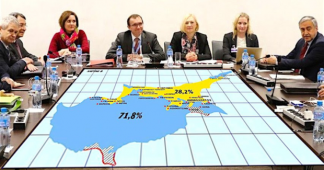By Prof. William Mallinson
Can this be done? I hope that by the end of this article, I shall have given you some food for serious thought about the causes and implications of the current chaos and fear pervading much of the world, but worse, our minds. The essential question is: why did this particular virus cause such worldwide social fear and havoc? But first, a bit of background.
It is hardly a secret that the phenomenon of globalisation and the much publicised and discussed ‘information revolution’ appeared in tandem, and were presented by the international business machine as new and positive phenomena, even if globalisation, in fact if not in name, began almost five hundred years ago, with Magellan’s circumnavigation.
The so-called ‘information age’ has been heralded for years as human progress, going hand-in hand with globalisation, itself also presented as progress.‘Innovation’ is a key word used by globalisation business cheerleaders. New technologies, such as ‘Smartphones’ and their never-ending ‘developments’, allied to various social media, are also presented as progress. ‘Twitter’, in particular, is now hailed by governments as a new political and even policy-making tool. For example, no self-respecting British ambassador is without his Twitter account.
One good example of the disappearance of semantic precision and deep thinking so vital to clear and thoughtful communication is Britain’s Foreign and Commonwealth Office (FCO): with the slow but inexorable introduction of the desktop computer, e-grams (the first one was sent in 2004)have replaced telegrams, and minutes are e-mailed to colleagues, often in the same room. Since there are no registries, it is far more difficult to access a paper file: instead, there is a series of cumbersome electronic steps to be gone through. Although all communications are meant to be registered, the procedure is far too time-consuming for most officers to bother to register a minute, letter or e-gram. In the serious days, whenever one read a letter, telegram or report, and had acted on it, one wrote either ‘pa’ (‘put away’) or ‘BU’ (Bring Up’) with a date. Before filing the paper, the registry clerk would note the ‘BU’ date, and give the file to the desk officer on the desired date. All that is gone. According to a recently retired ambassador, the collective memory has gone, and most written work is done ‘on the hoof’.
Yet this is all presented to us as ‘proof’ that we are becoming increasingly civilised, while the human race continues to kill its own kind in vast numbers. Giving a human the latest technological gadget can be seen as giving cannibals knives and forks.
Another connected factor is the increased speed of communication. This has led to shooting from the hip, immediate decisions being taken for decision’s sake, rather than being the result of serious reflection. Consider this: in order to think, we need the space not to have to think. Instead we are left with the mass of the population being zombified, led by appinions rather than opinions.
So now to the current ‘Corona crisis’. From at least the AIDS scare, through various types of flu, including the so-called common flu(which contributes to a huge number of deaths every year), there has never been such a hysterical reaction by governments, the media and big business, causing untold ‘collateral damage’, virtual martial law, and fear among people. Forget the various conspiracy theories, and consider, rather, the politicisation of the Corona question, for example the US media and political campaign against China, and the British media’s criticisms of Russia’s handling of the crisis, the latter to distract attention from the British government’s handling of the crisis (thousands have died in Britain, but only hundreds in Russia).
It is the manic speed of digitalisation and the concomitant digital confusion, with its plethora of conflicting causes and solutions, that have detracted from common sense in many quarters and led to more people dying than necessary. In countries that have looked only to expert, rather than political, solutions, the chaos has been handled better, despite the hysteria. Greece is a very good example.
To conclude, extreme, unadulterated and thoughtless digital globalisation has led to a lack of confidence among states to effectively manage their own internal affairs when it comes to a crisis that is immediately presented as global in nature, just as eggs are a global means of sustenance. Far from a measured, hysteria-free and ordered approach, it is the very lack of cohesion within countries that has characterised the handling of the eruption of the digital Corona virus. We can only hope that international co-operation between confident states, rather than ‘global solutions’ and political point-scoring, will somehow prevail. In the meantime, communication seems to be killing communication, paradoxically in the name of communication.
* Professor William Mallinson, Universitá Guglielmo Marconi
Author of Behind the Words, Cambridge Scholars Publishing, Newcastle upon Tyne, 2014 and 2016











